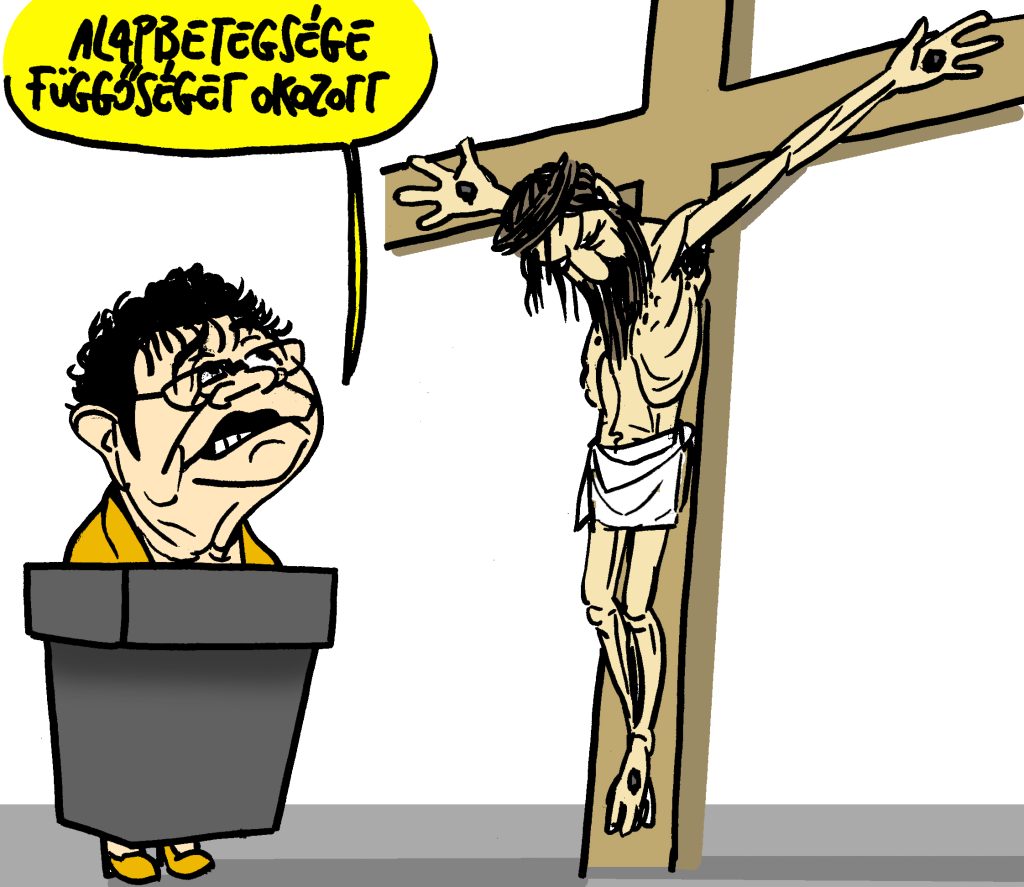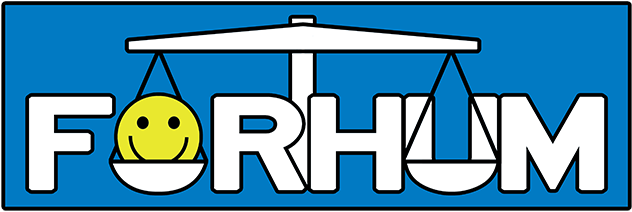
Mode of expression: Cartoon
Publication: Népszava
Region: Hungary
Relevant dates: 28 April 2020 – present
Outcome: Pending (case communicated to the European Court of Human Rights)
Judicial body: Budapest Metropolitan Court, Hungarian Supreme Court, ECHR
Type of law: Civil law
Themes: Religion/Blasphemy
Context and legal case
On 28 April 2020, the Hungarian cartoonist Gábor Pápai published a cartoon titled “Underlying conditions” in Népszava, an opposition newspaper that is often critical of the Orbán government. In the cartoon, Pápai caricatures Cecília Müller, the Chief Medical Officer at the National Centre for Public Health and a member of the government’s “Coronavirus Task Force.” Müller is depicted at a press conference where she faces a crucified Jesus and says: “…His underlying condition caused dependence.”. The line alludes to earlier statements by Müller, who stated on several occasions that those who died from Covid-19 were “predisposed” to death by pre-existing pathologies.
After publication of the cartoon, László Toroczkai, leader of the Hungarian far-right political party Our Home Movement, and the ruling Christian Democratic People’s Party (KDNP) announced their intention to sue Pápai for blasphemy. Pro-government media then launched a campaign of intimidation and harassment against “Pápai, with one radio station going so far as to call for the publication of his home address, because “there are many who would pay him a visit.”
In January 2021, the Budapest Metropolitan Court finally convicted Népszava for the publication of the cartoon “Underlying conditions” on 28 April 2020. The court had initially rejected the MP’s complaint, arguing that the cartoon “… was not aimed against Christian religion, it did not ridicule the Christian community and did not prevent Christians from freely practicing their religion … it does not justify restricting the freedom of expression and the press.” This verdict was denounced by the plaintiff and by András Veres, head of the Hungarian Catholic Bishops’ Conference, who was also a signatory of a joint statement by the leaders of religious communities “protesting against the humiliation and ridicule of religious symbols, sacraments and holy places” published following the Court’s verdict.
In a verdict delivered at second instance on 3 June 2021, the court finally found that the cartoon and its title infringed the plaintiff’s right to human dignity due to his membership in the Christian community in accordance with the article IX (5) of the Fundamental Law of Hungary.The court also ordered the newspaper to pay HUF 400,000 (EUR 1,140) to Imre Vejkey to reimburse the court costs and to publish an apology on its front page. The apology, handwritten by Pápai, was symbolically and ironically published in place of the daily press cartoon on 25 June 2021.
On 2 July 2021, Népszava announced that it was seizing the country’s highest authority (Kúria) regarding the Budapest Metropolitan Court’s decision to condemn the publication of the cartoon. In 2022, the Hungarian Supreme Court rejected the appeal. Referring to the case law of the European Court of Human Rights (ECHR), the court confirmed that the cartoon violated “the applicant’s right to protection of his human dignity in the context of his membership of a Christian religious community.” The court argued that the caricature could not claim absolute protection under the right to freedom of expression because the cartoon itself could be interpreted in various ways. Since it is not sufficiently intelligible to the public, the court concluded, it does not, in principle, contribute to public debate. As a result, the use of the religious symbol of the cross was deemed “self-serving” and “arbitrary” and the cartoon “offensive” and “suitable for violating the dignity of the Christian religious community, and through it the human dignity of the plaintiff belonging to the community.”
After the Hungarian Supreme Court rejected the appeal, the newspaper appealed to the ECHR.
Analysis
It is a common and successful strategy for many nationalist, authoritarian governments to discredit a work satire as ”insulting.”. Claiming they defend the national identity and traditional moral and religious values, politicians can make satirists out to be subversive elements that aim to undermine national identity or security. Similar cases exist in Turkey (see the next case concerning a cartoon by Zehra Ömeroğlu) and Jordan (see the case about Emad Hajjaj), and even in countries that are traditionally regarded as having a high degree of press freedom, there are instances of this, such as a post on X by the Dutch populist politician Geert Wilders calling on people to cancel their subscription to the Dutch newspaper Trouw because of a supposedly insulting cartoon.
In this case, we see that the cartoonist was not only targeted legally, but also by a media strategy that aimed to fuel outrage against him and the newspaper. Such a strategy not only aimed to intimidate Pápai and Népszava, but also works to deter other potential dissent. The verdict by the Hungarian Supreme Court is remarkable as well, since it places conditions on a political cartoon to claim protection under freedom of expression.
Sources and further reading:
Cartooning for Peace – Alert Hungary – Gábor Pápai: https://www.cartooningforpeace.org/en/soutiens/alert-hungaria-gabor-papai/
CIPE – No Laughing Matter: Press Freedom in Latin America Takes a Hit
https://www.cipe.org/blog/2014/05/06/no-laughing-matter-press-freedom-in-latin-america-takes-a-hit
Joop – Grootste regeringspartij PVV roept op tot strafactie tegen dagblad Trouw wegens kritische cartoon
